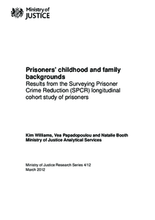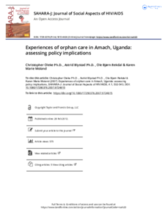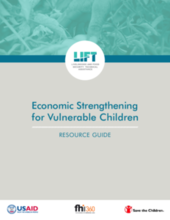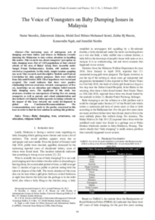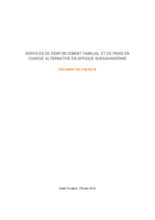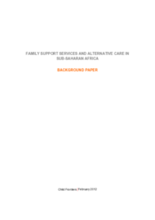Demographic Data
|
Sources: World Bank, UNICEF, UNDP HDR 2015, DHS 2013 |
Displaying 13001 - 13010 of 14557
This report presents findings of a study on the childhood and family backgrounds of 1,435 participants who were newly incarcerated in 2005 and 2006 in the United Kingdom. The report has a special focus on the experiences of abuse and care placement in childhood.
The National Family Preservation Network (NFPN) recently released its family assessment tool designed for use in Least Developed Countries (LDC). The tool aims to help a variety of workers serving families in least developed countries by providing methods and approaches to enhance family strengthening.
In the next few years, the Rwandan government hopes to close the majority of the country’s children’s homes. Rwanda’s so-called "child deinstitutionalization" (DI) policy, which, despite initial concerns, is attracting global support.
This paper presents findings from a study on the experiences of orphan care among Langi people of Amach sub-county in Lira District, northern Uganda, and discusses their policy implications.
Knowledge transfer is highlighted in this paper as a conceptual framework to understand mandated referral to Early Intervention (EI) services for young children with open child welfare cases.
"President Ellen Johnson Sirleaf today officially launched the Children’s Law of Liberia to protect children and their right to participate meaningfully in their development," says this press release from UNICEF.
This is a resource guide designed for PEPFAR implementing partners to help them effectively design and implement economic strengthening activities for vulnerable children. The guide lists gender, age, social inclusion, conflict, accessibility, chronic illness, and environment as reasons that certain children and households are vulnerable.
This article describes research conducted in Malaysia on young people’s perceptions of “baby dumping,” or the abandonment of newborns and infants, a phenomenon that has become a “serious issue” in Malaysia.
Ce document de contexte et les briefs nationaux individuels ont été commandés afin d'examiner le statut actuel des services de renforcement familial et de la prise en charge alternative dans dix-huit pays d'Afrique subsaharienne
This background paper and individual country briefs were commissioned to examine the current status of family support services and alternative care in 18 sub-Saharan Francophone, four Anglophone and two Lusophone African countries (a total of 22 countries). This background paper represents a comparative regional analysis, providing an overview of the current situation and illustrating promising practices, opportunities and challenges.

